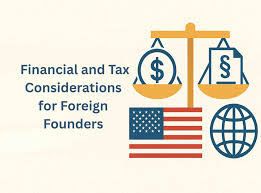Taxation of Foreign-Owned Startups in the U.S.
Starting a business in the United States is an attractive opportunity for foreign entrepreneurs due to its large market, innovation culture, and access to capital. However, navigating the complex tax landscape can be challenging for foreign founders, often resulting in overpayment of taxes due to improper structuring of their U.S. startup entities. In this comprehensive article, we explore the intricacies of U.S. taxation for foreign-owned startups, the importance of selecting the right legal entity structure, compliance requirements, and strategies to minimize tax liabilities while enabling global scalability.
Understanding U.S. Taxation Basics for Foreign-Owned Startups
U.S. taxation of entities is governed by various statutes administered primarily by the Internal Revenue Service (IRS). For foreign-owned startups, taxes apply not only on income earned within the U.S. but can also be affected by international tax treaties and foreign income taxation rules.
There are two primary layers of taxation to consider: federal income tax and state income tax. Additionally, startups must be aware of self-employment taxes, employment tax obligations if they have employees, and other regulatory fees. The choice of entity structure—whether it be a corporation, limited liability company (LLC), partnership, or branch office—significantly affects tax exposure.
Common Entity Structures for Foreign-Owned Startups
Foreign entrepreneurs commonly utilize one of the following entity structures when establishing their startups in the U.S.:
- C Corporation (C Corp)
- Limited Liability Company (LLC)
- S Corporation (not typically available to foreign owners)
- Partnerships
- Branch Office
Each structure has distinct tax implications. For instance, a C Corporation is a separate taxable entity subject to corporate income tax, whereas an LLC is generally treated as a pass-through entity, with profits and losses flowing to the owners’ personal tax returns. However, the default tax treatment of LLCs does not always apply to foreign owners, as detailed below.
Risks of Improper Structuring and Overpayment of Taxes
Foreign founders often inadvertently overpay taxes due to a lack of understanding about U.S. tax rules and entity selection. Common mistakes include:
- Forming an LLC without electing the appropriate tax classification
- Failing to consider the tax treaty benefits between the U.S. and the founder’s home country
- Not setting up a proper parent-subsidiary structure to limit double taxation
- Ignoring state-specific tax filing requirements and incentives
- Neglecting compliance with withholding tax provisions for payments made to foreign persons
Such errors can lead to unnecessary tax burdens, increased compliance costs, and exposure to penalties. Therefore, it is crucial to carefully plan the company structure and tax strategy at the outset.
The Role of Parent and Subsidiary Entities in Tax Optimization
Optimally structuring a U.S. startup often involves establishing a clear separation between the foreign parent company and the U.S.-based subsidiary. This approach enables foreign founders to take advantage of certain tax benefits and simplifies compliance.
For example, a foreign corporation may form a U.S. subsidiary as a C Corporation, which is treated as a separate taxable entity. Profits generated by the U.S. entity are taxed at the corporate level, and dividends paid to the foreign parent company may be subject to withholding tax, which is often reduced by applicable tax treaties.
This parent-subsidiary setup avoids the “branch profits tax” that applies to foreign corporations operating directly through a U.S. branch and allows for clearer accounting and legal separation. It also facilitates fundraising from U.S. investors, who often prefer investing in corporations rather than partnerships or LLCs with foreign owners.
Key U.S. Taxes Affecting Foreign-Owned Startups
Understanding the specific taxes applicable to foreign-owned startups is essential:
- Federal Corporate Income Tax: C Corporations are subject to a flat federal corporate income tax rate of 21% as of 2025.
- Branch Profits Tax: Applies to foreign corporations operating a U.S. branch; typically 30%, but often reduced by treaties.
- Dividend Withholding Tax: Dividends paid by U.S. subsidiaries to foreign parents are generally subject to a 30% withholding tax unless a tax treaty applies.
- State and Local Taxes: Varies by state; some states impose franchise taxes or gross receipts taxes in addition to income taxes.
- Effectively Connected Income (ECI): Income connected with U.S. trade or business is taxable to foreign persons.
- Self-Employment Tax: Foreign owners may be subject to self-employment tax on U.S. income depending on entity classification.
Tax Treaties and Their Impact on Foreign-Owned Startups
The United States has tax treaties with many countries that reduce or eliminate certain taxes such as withholding taxes on dividends, interest, and royalties. These treaties can significantly affect the tax liabilities of foreign entrepreneurs and their U.S. subsidiaries.
For example, a tax treaty may reduce the dividend withholding tax rate from 30% to 5% or 15% depending on the country of residence of the parent company and the percentage of ownership in the U.S. subsidiary. Additionally, treaties may provide benefits related to the elimination of double taxation and define tax residency rules.
Therefore, it is essential to analyze applicable tax treaties early in the planning process to optimize the tax position and ensure compliance with treaty requirements, such as appropriate documentation and certifications.
Compliance and Reporting Obligations for Foreign-Owned Startups
In addition to paying taxes, foreign-owned startups must comply with various reporting obligations to the IRS and state tax authorities:
- Annual federal tax returns (e.g., Form 1120 for C Corporations)
- Filing the IRS Form 5472 for certain reportable transactions between the U.S. corporation and its foreign related parties
- State income tax returns and any applicable franchise or gross receipts tax filings
- Withholding tax filings for payments to foreign persons (Form 1042 and 1042-S)
- Information returns for foreign owners and investments
Failure to comply with these obligations may result in substantial penalties and jeopardize the startup’s operations.
Strategies for Minimizing Tax Burdens
Foreign entrepreneurs can adopt several strategies to minimize taxation and maintain compliance, including:
- Choosing the correct entity type to align with business goals and tax efficiency.
- Leveraging tax treaties to reduce withholding taxes and avoid double taxation.
- Establishing a parent-subsidiary structure to isolate U.S. taxable activities from foreign operations.
- Utilizing state tax incentives for startups by selecting favorable jurisdictions.
- Regularly consulting with experienced tax professionals familiar with international and U.S. law.
Global Scalability Through Proper Legal and Tax Structuring
A well-designed legal and tax framework not only reduces immediate liabilities but also facilitates expansion and investment in global markets. A properly structured U.S. startup can attract investors, enter into partnerships, and license intellectual property efficiently, all while maintaining manageable tax costs.
Ensuring that the startup is compliant with regulatory requirements and tax rules provides confidence to stakeholders and prevents costly disruptions. Consequently, many growing foreign-owned companies prioritize tax-efficient structures from inception to sustain long-term scalability.
The Importance of Professional Legal and Tax Advice
Given the complexity and high stakes involved in U.S. tax compliance for foreign-owned startups, engaging knowledgeable legal and tax advisors is imperative. Professionals with expertise in international tax law, U.S. corporate law, and startup financing can craft tailored solutions that minimize tax exposure while enabling growth.
These advisors can also help with ongoing compliance, ensuring timely filings, proper documentation, and adaptation to legislative changes, such as those occurring through 2025 and beyond.
Foreign founders planning to establish startups in the United States face a complicated tax environment that can lead to overpayment and compliance issues if not managed properly. Selecting the right combination of parent and subsidiary entities is crucial to simplify compliance and minimize taxes.
Employing strategic tax planning, understanding applicable treaties, and maintaining diligent reporting practices enables businesses to operate efficiently and scale globally. For those looking to navigate this landscape with confidence, seeking specialized legal and tax counsel is highly recommended.
Legal Marketplace CONSULTANT is a company specializing in comprehensive legal and tax services for businesses and individuals. Our team includes attorneys, tax consultants, corporate lawyers, auditors, and accountants dedicated to guiding foreign entrepreneurs through the complexities of U.S. taxation.































